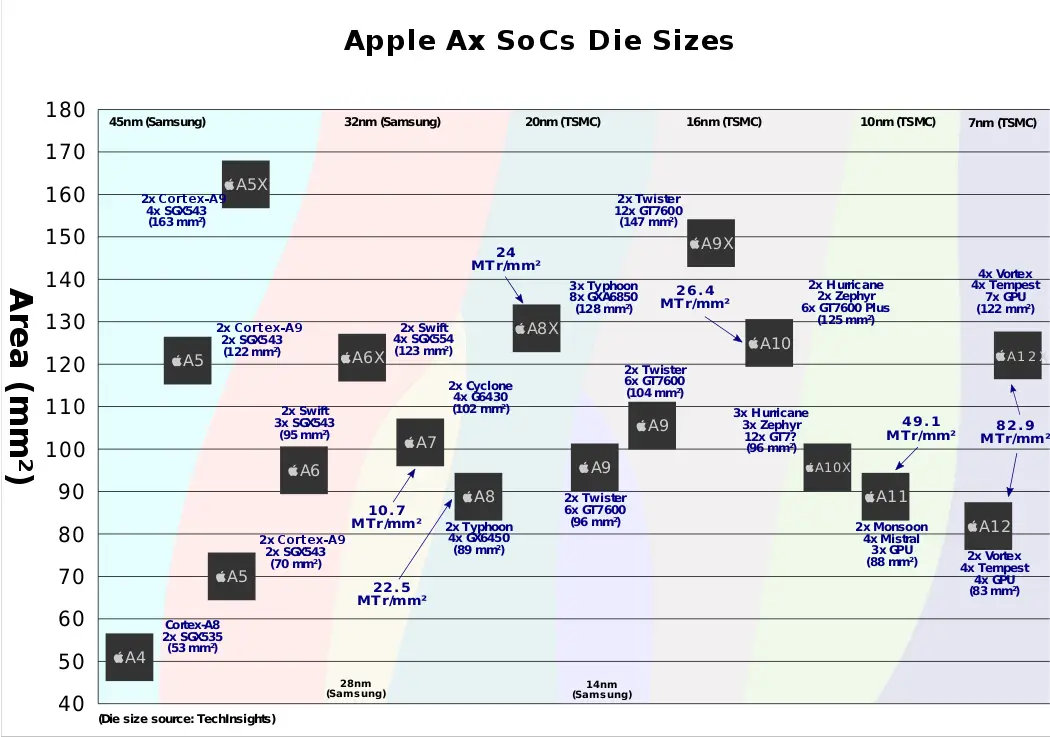From WikiChip
Difference between revisions of "apple/ax"
(Change Clock max from 2.5 GHz to 3.1 Ghz) |
(→Members: Added A15) |
||
| Line 72: | Line 72: | ||
* {{\|A12Z}} | * {{\|A12Z}} | ||
* {{\|A14}} | * {{\|A14}} | ||
| + | * {{\|A15}} | ||
}} | }} | ||
Revision as of 16:33, 21 October 2021
| Apple Ax | |
| Developer | Apple, ARM Holdings |
| Manufacturer | Samsung, TSMC |
| Type | System on Chips |
| Architecture | High-performance ARM SoCs |
| ISA | ARM |
| Word size | 32 bit 4 octets , 64 bit8 nibbles 8 octets
16 nibbles |
| Process | 45 nm 0.045 μm , 32 nm4.5e-5 mm 0.032 μm , 28 nm3.2e-5 mm 0.028 μm , 20 nm2.8e-5 mm 0.02 μm , 16 nm2.0e-5 mm 0.016 μm , 14 nm1.6e-5 mm 0.014 μm , 10 nm1.4e-5 mm 0.01 μm , 7 nm1.0e-5 mm 0.007 μm , 5 nm7.0e-6 mm 0.005 μm
5.0e-6 mm |
| Technology | CMOS |
| Clock | 800 MHz-3.1 GHz |
Ax is a family of high-performance 32-bit and 64-bit ARM system on chips designed by Apple exclusively for their consumer products.
Overview
Since the introduction of the original iPhone in 2007, Apple has been developing a series of chips designed exclusively for their own consumer products. Those system on chips are found in all iPhones, iPod Touches, iPads, Apple TVs, and Apple Watches. While initial models used IP cores licensed from ARM Holdings, since the introduction of the A6 in 2012, Apple has been developing their own microarchitecture for their chips which have become considerably more powerful than other ARM-based microprocessors.
Analysis
Die size comparison
Members
See also
- Qualcomm Snapdragon
- MediaTek Helio
- Intel Atom
Facts about "Ax - Apple"
| designer | Apple + and ARM Holdings + |
| full page name | apple/ax + |
| instance of | system on a chip family + |
| instruction set architecture | ARM + |
| main designer | Apple + |
| manufacturer | Samsung + and TSMC + |
| name | Apple Ax + |
| process | 45 nm (0.045 μm, 4.5e-5 mm) +, 32 nm (0.032 μm, 3.2e-5 mm) +, 28 nm (0.028 μm, 2.8e-5 mm) +, 20 nm (0.02 μm, 2.0e-5 mm) +, 16 nm (0.016 μm, 1.6e-5 mm) +, 14 nm (0.014 μm, 1.4e-5 mm) +, 10 nm (0.01 μm, 1.0e-5 mm) +, 7 nm (0.007 μm, 7.0e-6 mm) + and 5 nm (0.005 μm, 5.0e-6 mm) + |
| technology | CMOS + |
| word size | 32 bit (4 octets, 8 nibbles) + and 64 bit (8 octets, 16 nibbles) + |
